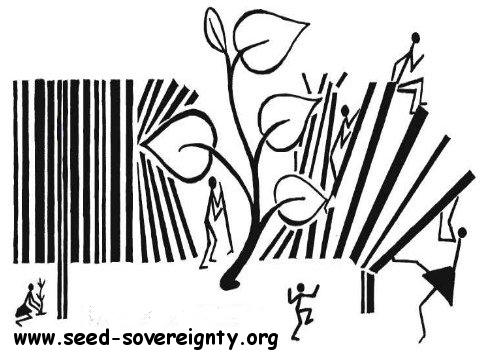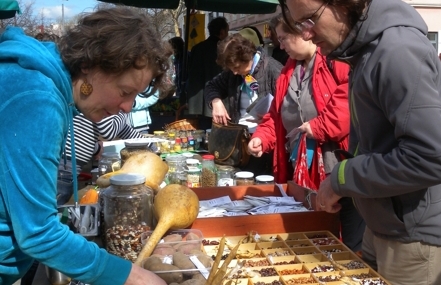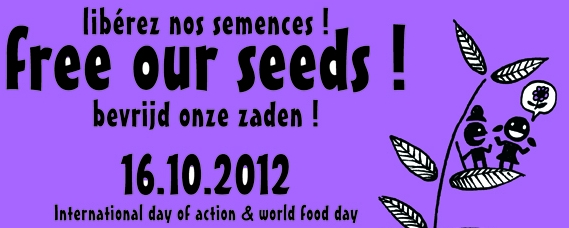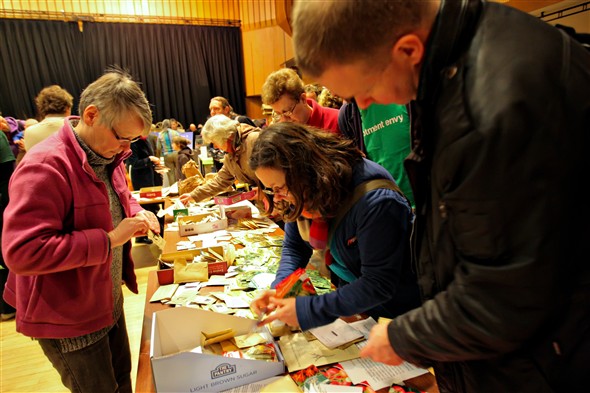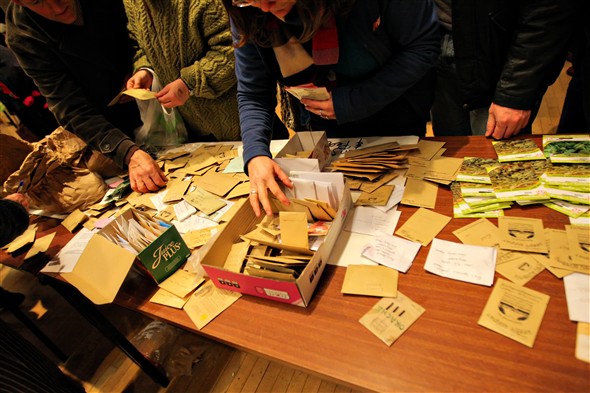
Sowing the Future - Harvesting Diversity
No
Patents for the Seed Industry!
Seeds must remain part of the
Commons!
Initiators of „Sowing the Future - Harvesting Diversity”:
IG für gentechnikfreie Saatgutarbeit
Arbeitsgemeinschaft bäuerliche Landwirtschaft (AbL)
Interessengemeinschaft Nachbau
Notkomitee für die Erhaltung der Weizenvielfalt ohne Gentechnik
Tisztelt
Európai Bizottsági
tagok,
Tisztelt Európai Parlamenti tagok,
Tisztelt
Európai Tanácsi tagok,
Jelenleg egy új
vetõmag-szabályozást készítenek
elõ Brüsszelben. Ha megvalósulnak az Európai
Unió Egészségügyi és
Fogyasztóvédelmi Fõigazgatóságának
tervei, akkor több régi és ritka gyümölcs-,
zöldség- és gabonafajta fog eltûnni a
piacról. Ezen változatos, illetve biotermesztéshez
alkalmazkodott fajták használatát a
bürokrácia megnehezítené, miközben
a mezõgazdasági nagyvállalatok befolyása
tovább erõsödne.
Az új európai
uniós vetõmag-szabályozás aktuális
tervezete elõsegíti, hogy a vetõmagpiac
néhány vetõmagipari vállalat kezében
összpontosuljon. Ez elfogadhatatlan. Az új európai
uniós vetõmag-szabályozásnak lehetõvé
kell tennie a fajták változatosságának
megõrzését, a kisléptékû
gazdálkodásban alkalmazható fajták
használatát, valamint az ökológiai
alkalmazkodáson alapuló nemesítést. A
változatos fajtákat ne csak a génbankokon
keresztül lehessen elérni, hanem nyíltan a
piacokon is, bármiféle bürokratikus korlátozás
nélkül.
Ezért azt követeljük,
hogy ne legyen kötelezõ a regisztráció
(fajtabejelentés). Továbbá azt, hogy a
jelenlegi regisztrációs kritériumokat
enyhítsék az olyan fajták esetében
amelyek a sokféleségükbõl adódóan
alkalmasak a biotermesztésre, mivel így a
mezõgazdaságunk klímaváltozáshoz,
új kártevõkhöz és betegségekhez
való alkalmazkodóképessége megmarad,
és továbbra is lehetõvé teszi egy
környezetbarátabb életmód kialakítását.
Sem a mostani európai uniós vetõmag-szabályozás
sem pedig a jelenleg elérhetõ, nem hivatalosan
elõterjesztett törvényi változtatások
nem felelnek meg ezeknek a követelményeknek.
Veszélyeztetik a vetõmag-sokféleséget,
ezáltal pedig az emberiség közös
mezõgazdasági örökségét.
Továbbá veszélyeztetik a fenntartható
élelmiszerellátó-rendszereket is, és
csupán azért hozták létre õket,
hogy az agrokémiai ipar érdekeit szolgálják.
Arra kérjük Önöket, az Európai
Bizottság, az Európai Parlament és az Európai
Tanács tagjait, hogy utasítsanak el minden olyan
javaslatot, amelyik nem teljesíti a fent említett
kritériumokat!
Ne pusztítsák tovább
az európai mezõgazdasági és kertészeti
vetõmag-sokféleséget!
További
információ:
- Kampány a
vetõmag-önrendelkezésért:
www.seed-sovereignty.org
- Német ernyõszervezet
a termények és a haszonállatok sokféleségéért
(„Dachverband Kulturpflanzen- und Nutztiervielfalt e.V.“):
www.kulturpflanzen-nutztiervielfalt.org/node/29
- A termesztett növények megõrzéséért
küzdõ német szövetség („Verein
zur Erhaltung der Nutzpflanzenvielfalt e.V.“):
www.nutzpflanzenvielfalt.de
- Patrick Wiebe blogja: www.bifurcatedcarrots.eu/
Miért
van szükség egy jobb szabályozásra?
Az EU jelenlegi, vetõmagokkal kapcsolatos szabályozása
abból az idõszakból származik, amikor
még alábecsülték a környezvédelem,
valamint a természeti és biológiai sokféleség
fontosságát. Számos olyan, fajtanemesítéssel
foglalkozó vállalat volt akkoriban, melyek igen
sokféle növényfajtával jelentek meg a
piacon. A növényfajták nagy részét
betakarítás után újra lehetett vetni;
ezt az eljárást évezredek óta –
a mezõgazdálkodás kezdetétõl
fogva – alkalmazzák.
A nyolcvanas években
két új fogalom került bevezetésre,
melyek korábban általános gyakorlatnak
számítottak: a „gazdálkodói
jogok”, valamint a „szabad megporzású/szabad
elvirágzású fajták” (ezen fajták
vetõmagjával ugyanaz a fajta állítható
elõ, hacsak nem keresztezõdik hasonló
fajtákkal). Ennek az az oka, hogy a vetõmagpiac
drámai változáson ment keresztül.
Napjainkban a tíz legnagyobb vállalat uralja a világ
vetõmagpiacának háromnegyedét. A
globális piac több, mint a felét pedig a
vegyipar adja.
A legtöbb növényfajta jogi és
szakmai korlátozások alá esik, mely
megnehezíti, hogy a termesztõk által befogott
magokat újra lehessen vetni. Hivatalos jóváhagyást
vezettek be a növényfajták és
vetõmagjaik forgalmazását illetõen, és
az erre vonatkozó kritériumrendszert az ipari
fajtákhoz adaptálták. A termelékenységgel,
valamint a Föld növekvõ népességével
próbálták igazolni a fenti lépéseket.
Az IAASTD (Nemzetközi felmérés a mezõgazdasági
tudás, tudomány és technológia
hatásáról a világ fejlõdésére)
átfogó jelentésébõl látható,
mennyire bizonytalan ez a megközelítés.
A
haszonnövények sokszínûsége
nagymértékben eltûnt a piacról. Ez
aggodalomra ad okot a nem regisztrált fajták
diverzitásával kapcsolatban; ezekkel a fajtákkal
többezer bátor európai ember kereskedik
anélkül, hogy rendelkezne a szükséges
regisztrációval. Manapság ezeknek az
embereknek a széles körû szakértelmére
támaszkodunk, és bátorítanunk kell ezt
az egyre népesebb csoportot, akik nem csupán
kedvtelésbõl vesznek részt a fenti
tevékenységben, hanem bevételük is
származik belõle, és a megélhetésüket
is részben ez adja.
A másik fontos szempont
pedig az, hogy alig van néhány olyan, megfelelõ
növényfajta, melyeket kifejezetten a biogazdálkodás
számára hoztak volna létre a sokféleségük
alapján. Az ökológiai gazdálkodásnak
azonban szüksége van olyan növényekre,
amelyek vegyszerek nélkül is elég erõsek
és ellenállók. Ez kizárólag egy
széleskörû, természetes génkészlettel
lehetséges. A jelenlegi, vetõmag regisztrációra
vonatkozó kritériumok alapján a fent említett
növényfajták regisztrációs
kérelmét rutinszerûen elutasítják.
Valamennyiük nevében aláíró.
Reports of the actions in Geneva, Brussels, Mainz, Vienna and Lisbon
Invitation to the action days in Brussels
La
Via Campesina, 16.3.2011:
BALI
SEED DECLARATION
Peasant
Seeds: Dignity, Culture and Life. Farmers in Resistance to Defend
their Right to Peasant Seeds
Szabad vetőmagot mindenkinek!
Brüsszel, 2011. április 17-18.
A Via Campesina mozgalom április 17-én, a földművesek nemzetközi ellenállásának napján, fontos brüsszeli eseményt szervez.
Az eseményen az elmúlt két évben Európa minden részéről érkezett több tízezer aláírást átadják az Európai Parlamentnek, és vizsgálatot kérnek annak tisztázására, hogy az Európai Unió új vetőmagtörvény-tervezete amelyekben a nagy vetőmagcégek érdekei voltak túlsúlyban - megsértik-e az alapvető jogot az élelemhez és a vetőmaghoz való hozzáféréshez.
A Via Campesina mozgalom azt követeli, hogy a vetőmagtermesztés joga az őstermelők és kertészek kezében maradjon, ugyanis az emberiséget évezredekig a termények sokszínűsége táplálta. A korábbi nemzedékektől örökölt magvak az élet alapjai, és az élelmiszer-önrendelkezés elengedhetetlen feltételei.
A nagy vetőmag előállító cégóriások ugyanis elszántan dolgoznak az élelmiszerlánc első eleme fölötti világméretű irányítás megszerzéséért.
Ennek egyértelmű jele a génmódosítás, az állat- és növényfajokra bejegyzett szabadalmak, a magok újravetésére kirótt büntetések, a háztáji
fajták betiltása, továbbá az a gyilkos technológia, ami terméketlenné teszi a magvakat. Meg kell akadályoznunk, hogy az élelmünk legfőbb alapja multinacionális cégek profitjának forrásává váljon!
Arra kérünk, Te is vegyél részt a kétnapos akción, amely során egyértelműen jelezzük az EU politikája iránti ellenérzéseinket, és a szándékunkat az ellenállásra! Ellenállásra, hiszen nem fogadhatjuk el, hogy megélhetésünk alapjai multinacionális vállalatok kezében kerüljenek, mert a jövőben is szeretnénk megőrizni és továbbadni a változatos növényfajtáink örökségét.
Ha nem tudsz eljönni Brüsszelbe, szervezz hasonló eseményeket hazádban, a városodban, faludban!
Supporters
of „Sowing the Future - Harvesting
Diversity”:
Österreichische
Bergbauern- und Bäuerinnen Vereinigung (ÖBV), Via
Campesina Austria (A)
BUKO-Kampagne gegen Biopiraterie (D)
Aktionsnetzwerk globale Landwirtschaft (D)
Basler Appell gegen Gentechnologie (CH)
Percy Schmeiser; canola farmer, (CAN)
Peliti / Πελίτι - Greek Seed exchange Network
ICPPC - International Coalition to Protect the Polish Countryside (PL)
Free our seeds!
International
Days of Action
Brussels, 17-18 April 2011
Supporter of the international days of action
from Belgium:
Nature
& Progrès
Le Début des Haricots
Rencontre
des Continents
MAP
Quinoa
Réseau des GASAP
Les
amis de la terre
Kokopelli
FIAN Belgium
Le Centre
liégeois du Beau Mur
La ferme du Hayon
Mouvement des
objecteurs de croissance
La Bande de Gasath
Collectif
123
SOS Faim
Associations 21
ADG
Oxfam
Solidarité
FUGEA
Terre & conscience
Collectif
Artivist
Reclaim The Fields
CITY MINE(D) –
BRXL
Grappe
magasins du monde OXFAM
Comité pour le
respect des droits humains "Daniel Gillard"
Maison
des Cultures et de la Cohésion
Sociale
Wervel
klorofil
okno
Les Jardins de
Pomones
Tuinbouwbedrijf Akelei
les Vers Tiges au Balcon
from Europe
Arbeitsgemeinschaft
bäuerliche Landwirtschaft (AbL, D)
BUKO-Kampagne gegen
Biopiraterie (D)
Compagnie Mai Mun (A)
Forum civique
européen
Hofkollektiv Wieserhoisl (A)
JANUN Göttingen
(D)
Longo Maï – coopérative européenne
ÖBV
– Via campesina Austria
Via Campesina
Europa
Gentechnikfreies Europa
Let‘s meet in Brussels!
Program:
Tens of thousands of people throughout Europe are actively demanding that the right to produce seeds remains in the hands of small farmers and gardeners. A diversity of crops has nourished mankind for thousands of years. Seeds that we have inherited from past generations are the basis of life and are essential for food sovereignty.
The big seed trusts are determined to obtain worldwide control. This has been made clear by genetic engineering, patents on plants and animals, the introduction of seed reproduction fees… Add to that terminator technology that destroys the fertility of seeds and the prohibition of peasant varieties. We must prevent the very basis of our food supply from becoming a source of profit for multinational companies.
Two years ago we launched the petition „Sowing the future-harvesting diversity“ to protest against planned new European Union seed laws that are dominated by the interests of the big seed companies.
We intend to present the tens of thousands of signatures collected throughout Europe to the European Parliament and call for an enquiry to clarify whether these laws violate the fundamental right to food and to access to seeds.
We invite you to participate in two days of action during which we will make clear our opposition to EU policies and our intention to resist against them.
Come to Brussels! We are not prepared to accept that the basis of our livelihood is handed over to multinationals. In the future we intend to maintain and pass on the heritage of our plant varieties.
The main event will take place on 17 April, the day of international peasant resistance declared by Via Campesina, followed by a demon-stration on the 18th.
If you cannot come to Brussels, organise similar events in your countries, cities and villages!
Sunday,
17 April 2011
11.00 -18.00 Molenbeek Cultural Centre: "Maison des Cultures et de la cohésion sociale de Molenbeek-Saint-Jean", Chaussée de Merchtem 67, 1080 Molenbeek-Saint-Jean
International
Seed Swap and
multilingual exhibition on seeds
Through this seed swap we want to draw public attention to a practice that has become increasingly widespread throughout Europe over the past few years and that could be made illegal by the planned EU laws.
16.00
-19.00 Molenbeek Cultural Centre
Conference
with presentations and debate
„Access to seeds is a
human right“
Activists from India, Turkey and several European countries will describe the situation concerning seeds in their countries and the consequences of the planned EU laws.
19.00
– 24.00 Molenbeek“ Cultural Centre
Music and films, dance and demo workshop
Monday
18 April 2011
10.00 -13.00 "Mundo B", Rue d'Edimbourg 26, 1050 Bruxelles
World-Café
Getting to know each other, exchange of experience and knowledge, discussions on collective work on seeds and the maintaining and multiplication of plant and crop diversity in gardens and fields.
15.00
-17.00 Demonstration
Demonstration to the Brussels offices of seed companies and their lobby organisations
Please contact us if you want to take part in these events and in the growing resistance against the monopolisation and privatisation of seeds !
Seedy Sunday 2010 in Brighton:
Photos by Dan Johnson Photography
Grassroots Seed Activism in the UK, by Debbie Greenfield, Chair, Seedy Sunday Brighton
Invitation to a
seed swap and exchange of know-how
Brussels, Sunday 17 April 2011
Within the framework of two days of action, an international seed swap will be organised with the aim of circulating all kinds of hardy and reproducible seeds and exchanging information, experiences and know-how on the production of seeds.
This event will bring together many initiatives which already exist in various countries. It will give them an occasion to present their activities and to establish links between us. This has become all the more urgent in view of the fact that European and international laws and regulations, either already in force or in preparation, could very well hinder or even prohibit such seed swaps.
Our main objective is to encourage the practice by farmers, amateur and professional gardeners of exchanging and giving seeds. This ancient tradition could be adopted by all people who are aware of the loss of diversity of varieties and of the risk posed by the growing privatisation of life-forms. We are witnessing a serious erosion of theoretical and practical knowledge. We want to look at ways of drawing attention to this danger and of passing this know-how on to a wider public.
To achieve this, we must use all means at our disposal!
Bring whatever you can that you think is appropriate to this event : seeds, exhibitions, slide shows, brochures, documents, films… Proposals for workshops (production and extraction of seeds, awareness building on gardening and agriculture…) or exhibits (vegetables, fruit, seeds, cereals or other collections of biodiversity…) will be welcome. Help us to awaken all our senses!
During the morning of Monday 18 April there will be time for meetings and discussions between all those interested in getting to know each other better. We would like to imagine together how experience and know-how concerning seeds can be passed on. Do you have training or pedagogical tools or methods which could be shared by others? In your opinion what would it be important to develop and in what form? Would you be ready to participate in the elaboration of such tools? Do you want to suggest other subjects for discussion on Monday morning?
Practical aspects
For the seed swap, send us an exact list of what you need: space, tables, electricity, exhibition panels… If you cannot take part, you could send seeds that you are ready to share with us. The more seeds there are, the more diversity will be distributed. We ask you only to bring naturally produced reproducible varieties (no F1 or F2, GMOs, GMPs) with no risk of unintentional crossbreeds between varieties.
We will send you a more detailed program once it is available.
By
nature seeds are nomadic,
let us help them to travel!
Longo Maï Seed-exhibition and excange in Païs Alp 2009, Provençe:
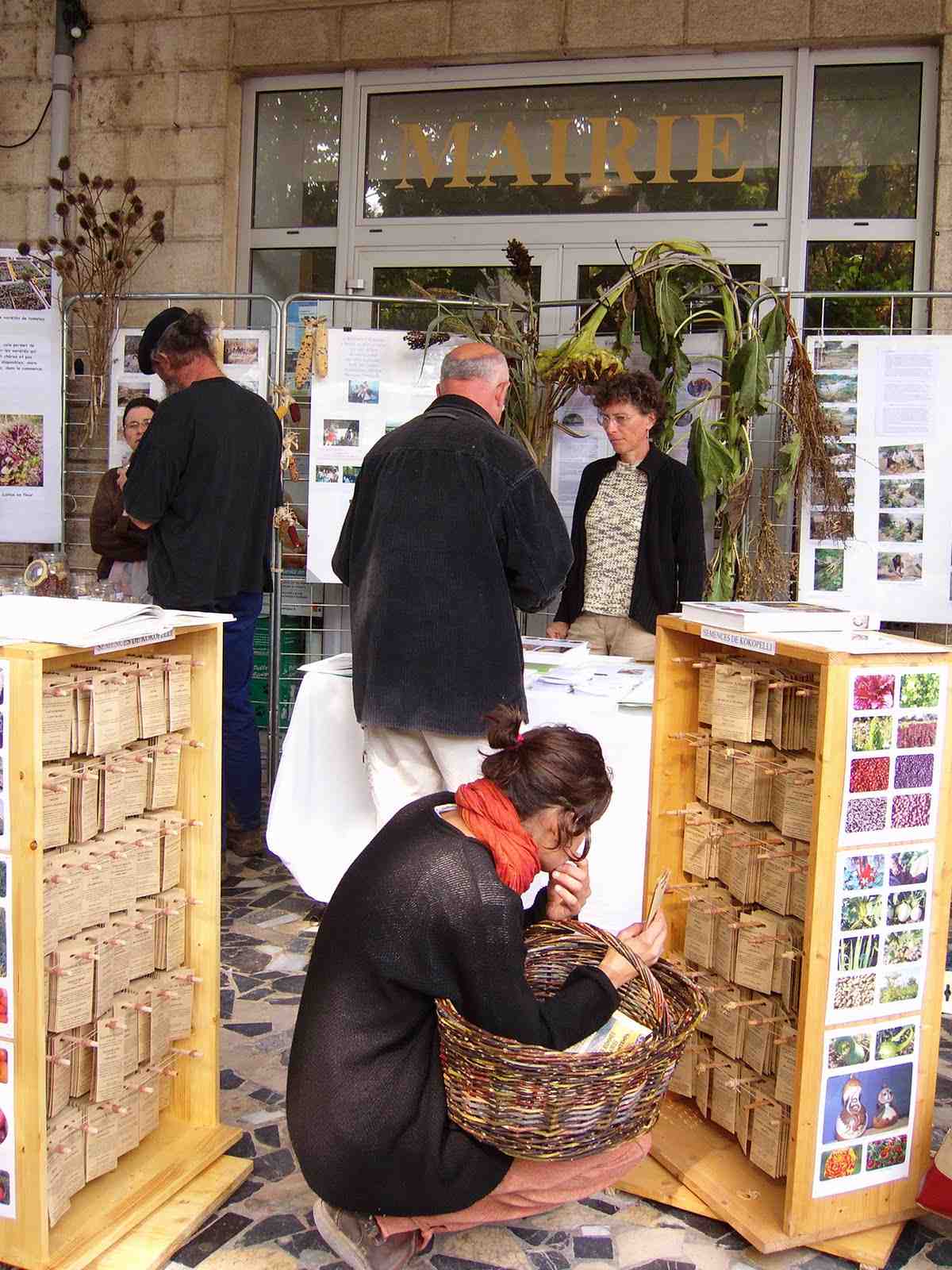
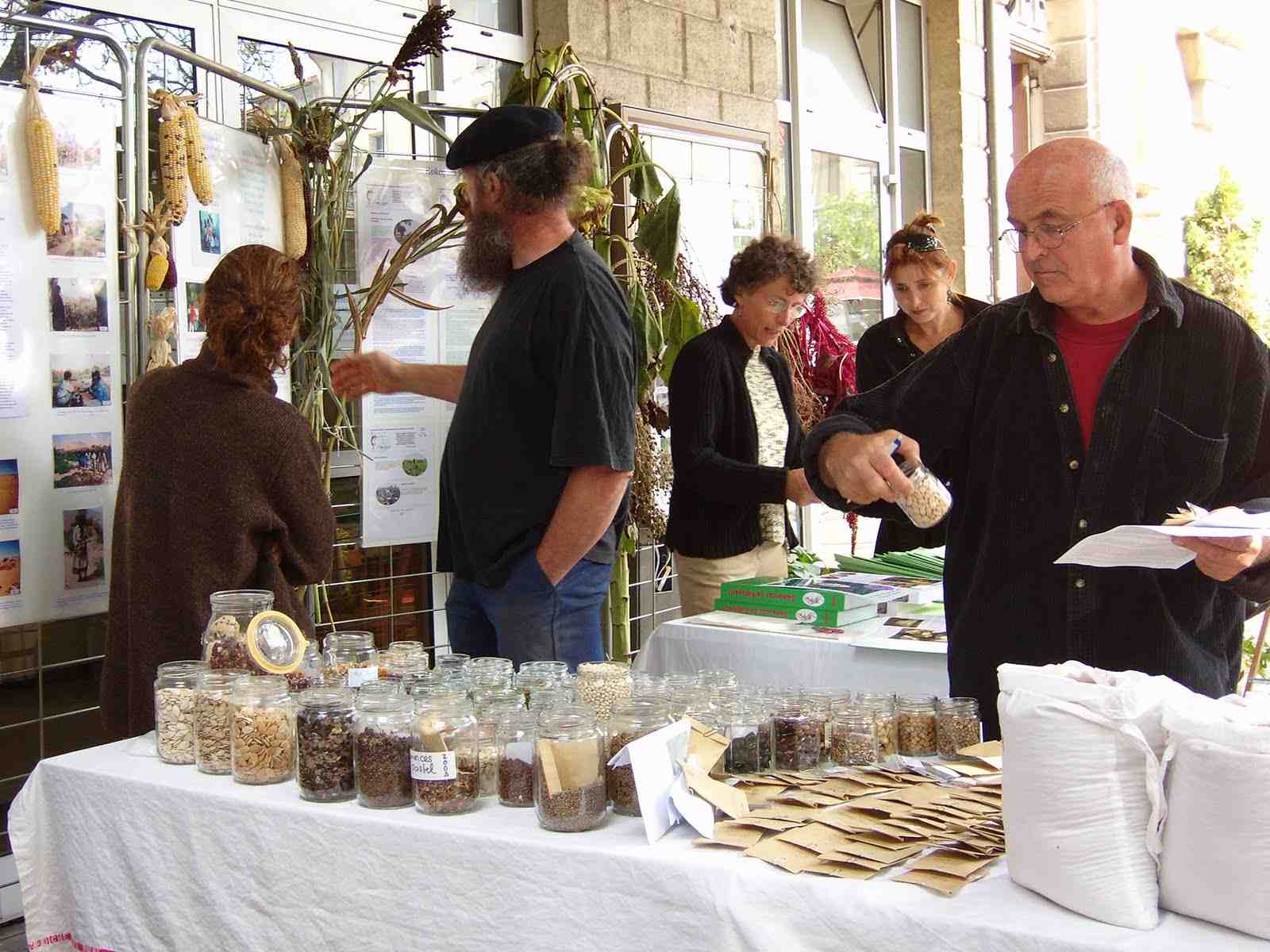
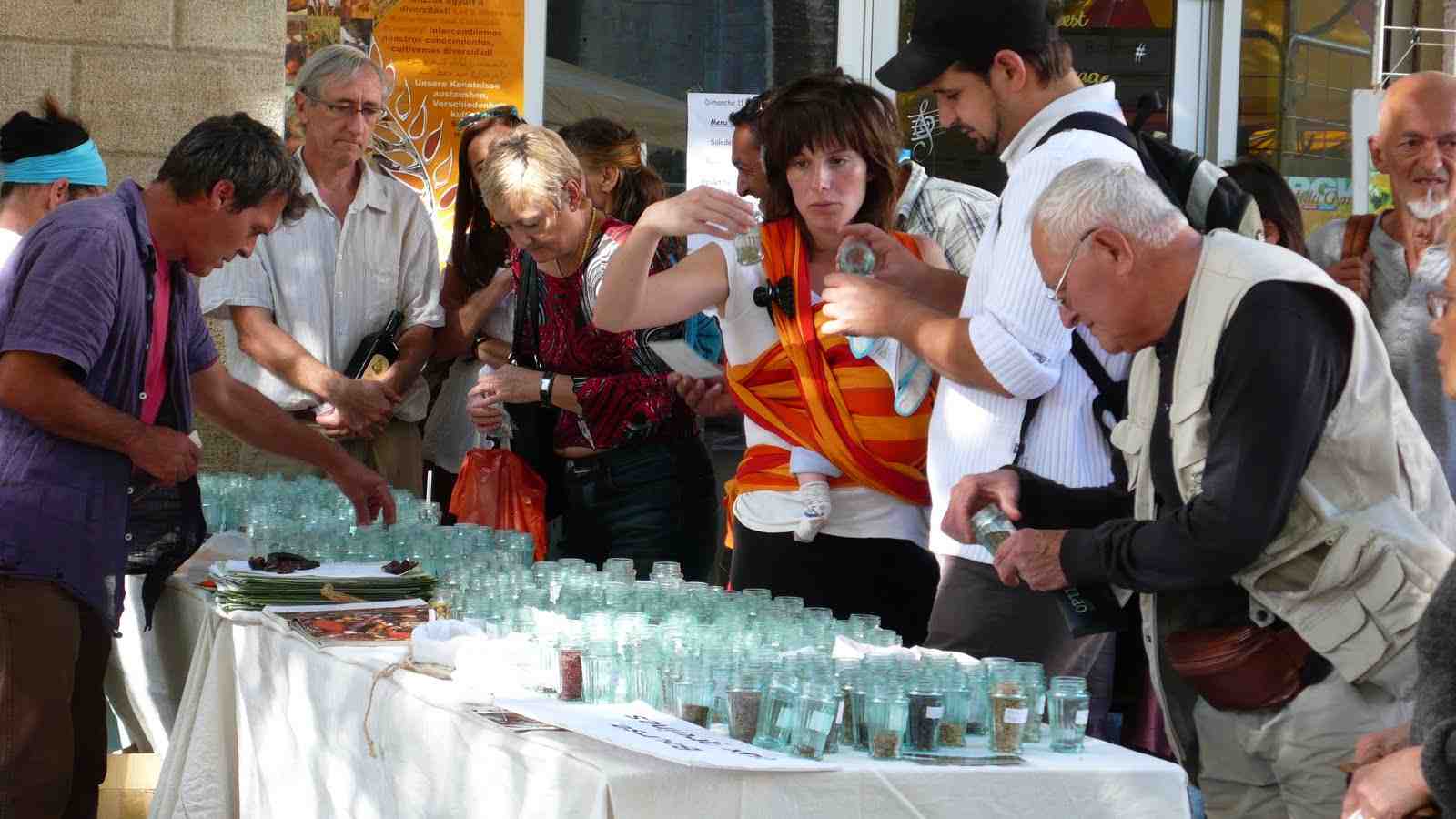
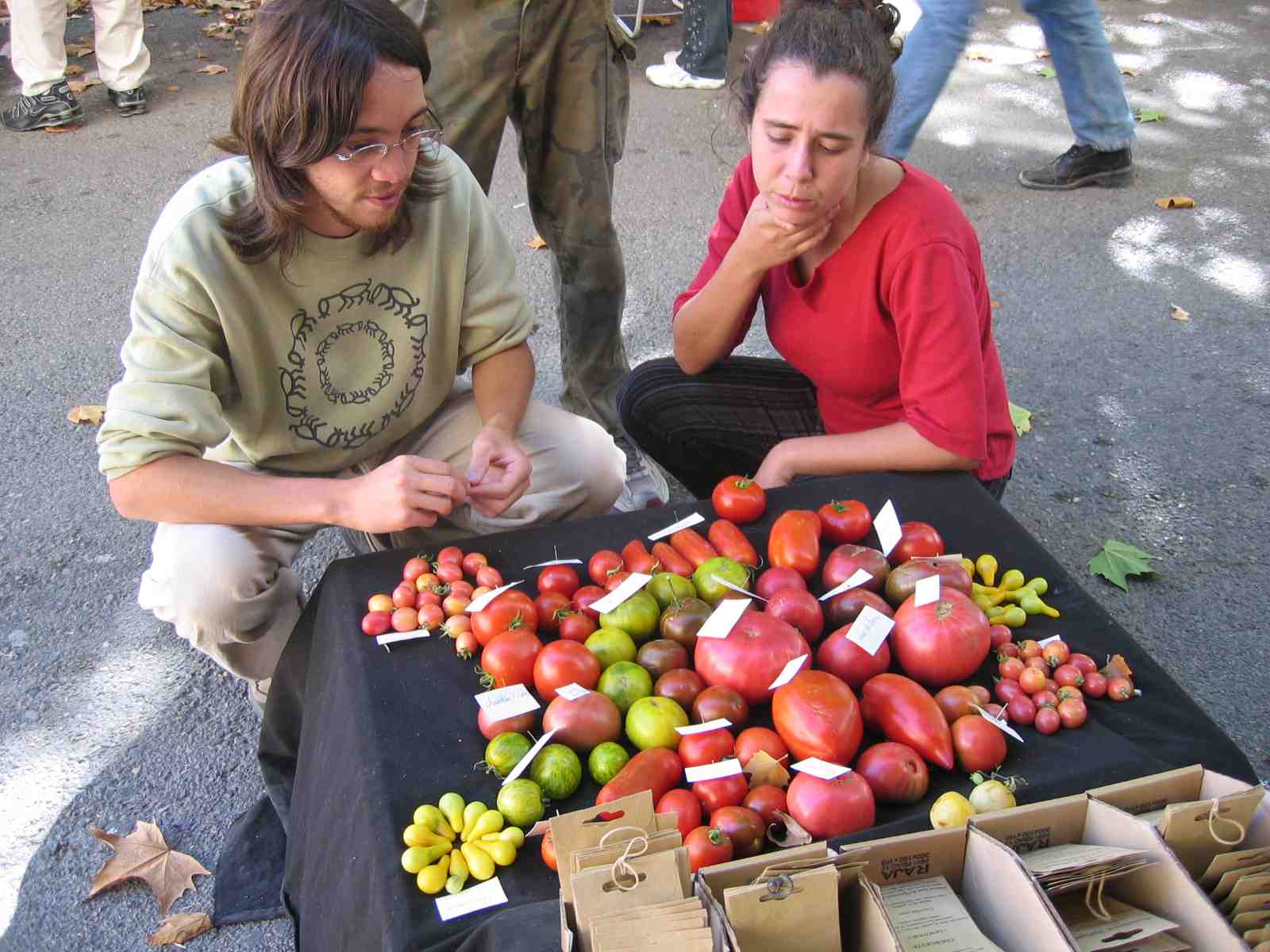
Participants (27-03-2011):
Les jardins de Pomones (Belgium)
Deccan Development Socity (India)
Irish Seed Savers Association
Kokopelli (Belgium and France)
Gartenbaubetrieb „Akelei“ (Belgium)
„De Godin“ Essbare Landschaften (Netherlands)
Longo Mai (France and Germany)
Scandinavien Seedsavers
Heritage Seed Library (England)
Peliti (Greece)
Tom Wagner (USA)
De Velt (Belgium)
International Coalition for the Protection of the Polish Countryside (ICPPC)
Naturalni (Poland)
„Poland free of GMO”
From March 25. to 27, 2010, 160 representatives of the European seed networks gathered in Graz, Austira, for the 5th European Seed Meeting “Let’s Liberate Diversity!”. They included groups that work on the conservation, use and distribution of plant diversity, civil society organizations, gardeners, breeders, and men and woman farmers from over 20 countries. (...)
Graz Declaration: Freedom for Diversity
(...)
We demand:
the right to obtain seeds from our own harvest, to re-sow, distribute and sell them;
the promotion of diversity in all regions by supporting conservers and breeders of varieties that can be re-sown;
the prohibition of genetic modofication technologies in agriculture;
the prohibition, without exceptions, of patents on plants and animals, their traits and genes, as well as patents on breeding methods;
a new agrarian policy, which, instead of supporting energy-intensive industrial production and monocultures, promotes biodiverse and ecological production.
These demands are directed toward Member States and the European Institutions.
The participants of the 5th European Meeting in Graz, March 2010.
Crop diversity is the result of human actions all over the world that created it. It is a common good and it belongs to everyone. Access to diversity is fundamental for our daily bread and for achieving food sovereignty. In many regions of the world men and women farmers still continue to produce, exchange, and sell their own seeds.
Seed laws in Europe are to be changed in 2011. The seed industry wants to extends its intellectual property rights and the patenting of crop varieties. It lobbies for stronger control and even the prohibition of farmers' non-registered varieties.
10 companies, among them Bayer, Monsanto, Syngenta and Limagrain, already control 67% of the world seed market. They no longer want to miss out on the rest of the market when they could impose their registered varieties - which usually only thrive with the help of chemical fertilizers, pesticides and irrigation - upon the rest of the world. However, it is not these genetically homogenous industrial seed varieties which will be able to feed the world in the future, but the diverse, regional varieties which are able to adapt to climate change.
The negotiations for the new European seed law are taking place behind closed doors, among representatives of the seed industry and EU bureaucrats. This does not lead us to expect a positive outcome. In order to influence the new seed laws we want to raise public awareness for our goals.
We demand:
the right to produce our seeds from our own harvests, to re-sow and to give them to others;
to encourage regional crop variety by supporting the men and women who keep and breed organic varieties;
to forbid genetic technologies in agriculture;
to exclude patents on plants;
to forbid GMOs and varieties that require intensive chemical use;
to end high energy inputs in agriculture which are the result of monocultures, long transport routes as well as industrial crops that require chemical fertilizers and pesticides.
5th
Meeting
of the European Seed Network
“Let's
liberate diversity"
Graz,
Austria
25 -27 March 2010
Program
